- Home
- Aaron Allston
Wraith Squadron Page 3
Wraith Squadron Read online
Page 3
Janson's voice was ragged. "Eleven pilots we trained. Wiped out by a simple ambush. What a pair of incompetents we must be."
Wedge shook his head. "It was more than a simple ambush. We'll know how much more soon. In the meantime, don't tear yourselves up. Any one of us could have been lured into something like that—all we'd have to do is base decisions on Intelligence reports that seemed reliable. You understand?"
Both men nodded.
From a flight suit pocket Wedge produced a datapad; this he handed to Janson. "There are a couple of files on this. One is a set of pilot-data criteria. The other is authorization to run it against pilot profiles across records of all New Republic armed forces. Tomorrow, I want you to assemble a list of all pilots matching the criteria, then begin to contact them, find out how many of them are willing to put in for transfer to my new squadron for possible permanent assignment. I'll bet pretty close to one hundred percent will be. Those who answer in the affirmative, send to Folor without informing them of their destination; we'll meet and evaluate them there."
He turned to Hobbie. "As soon as you've had a chance to debrief Donos, I want you to work up a simulator run based on the mission that destroyed Talon Squad. It will be one of the first simulator training sessions the new squad attempts—and the next one Rogue Squad experiences. So it doesn't happen again."
"Understood," Hobbie "After due consideration and review, I think it's a terrible idea," said General Crespin.
It was weeks later, and Wedge Antilles stood before another military leader in another office and prepared to plead his case again. Wedge felt irritation well up within him. Crespin might be his superior, but did not have a grasp of small-unit fighter uses and tactics superior to Wedge's. Few, if any, officers did. But he clamped down on his emotion. It was important to meet Crespin reason for reason, fact for fact; if he let emotion dictate his defense he would lose this argument.
General Crespin, new commander of the fighter training base on the moon called Folor, and personal commander of two training squads of A-wings, paced behind his desk while Wedge remained standing at attention before it. Crespin was a tall, lean man who seemed to know only two expressions, impassive and stern. Since the last time Wedge had seen him, in the briefings before the assault on the second Death Star, Crespin had been promoted from colonel to general, had picked up a limp, and had had his left eye replaced by a glossy black optical; he usually wore a mirrored patch over the mechanical replacement, as the patch was far less ominous than the black, inhuman eye. Wedge suspected the general could see through the patch. Wedge had heard that Crespin had been injured during a bombardment by Zsinj's Super-class Star Destroyer, Iron Fist, against a New Republic military base established near the border to Zsinj-controlled space.
"We don't need misfits representing the New Republic," the general continued. "We need heroes. Men and women with proper character and clean records. Hologenic pilots who'll look good in the broadcasts, good in the archives."
"With all due respect, General, that's equivalent to piloting a course right into the dark side of the Force."
Crespin's head snapped around and he glared at Wedge. "You're insolent. Explain yourself."
Wedge took a deep breath. Contain your anger. Make him an ally, not an enemy. "First, since the Alliance was first formed, we've made it a policy to accept Imperial defectors."
"I know that. I'm one of them." Crespin's chin came up, as if he were inviting Wedge to address the question of his loyalty.
"Yes, sir. So, as you know, sometimes these people had just been waiting for the chance to side with us. Like yourself. Sometimes they jumped when our position was stronger than the Empire's. Sometimes they jumped for purely selfish reasons. We never cared, so long as they did their jobs, continued to aid the New Republic, and stayed loyal to our goals."
"So?"
"So all these defectors are retreads, General. Many are men and women with spots on their records. Sometimes more than spots. Here's an example. We pulled Black Sun criminals off Kessel, introduced them onto Coruscant, and kept the faith with them so long as they did with us. You seem to be saying that their contributions should be ignored, kept hidden—the only people whose efforts we acknowledge will be those with spotless records, uniforms, and faces."
"Ridiculous."
"Second, this idea that appearance needs to be a factor in the choice of new pilots so they'll look good on holograms and broadcasts—sir, I understand your reasoning, and I approve"—the lie nearly stuck in Wedge's throat but he accelerated past it—"but it exposes the New Republic, the Provisional and Inner Councils, to a danger I think you've overlooked."
"Which is what?"
"If all our pilots have to look a specific way, meet or surpass some arbitrary degree of beauty, we're exactly the same as the Empire, which kept hundreds of sapient species under its heel because they weren't human. Because they didn't meet specific human standards of appearance."
"Preposterous!" But Crespin looked a trifle shaken by Wedge's last accusation.
"Of course it is, sir. It's more than preposterous, it's idiotic. Especially in light of all the nonhumans in Rogue Squadron and other units. But put that argument into the hands of Imperial insurgents working within the New Republic and you'll have insurrections, protests from every New Republic signatory race that isn't represented in the cockpit of an X-wing or A-wing somewhere."
Crespin grimaced but didn't answer.
"Third, the new squadron's makeup allows for better, not poorer, public relations. Every pilot who makes it will be a success story, a come-from-behind story, suited to a holodrama or series. Most importantly, they'll be common-being stories. Not everyone can identify with Corran Horn from Corellian Security, or with Bror Jace, millionaire prince of the bacta-producing monopoly on Thyferra. But some tug pilot who joined the Alliance, fumbled his career into the gutter, and then recovered it, repaired the damage he'd done to his life—"
"Yes, yes." Crespin waved for him to be quiet. "Very well, Commander. Your passion for this experiment is obvious. Your reasons are sound. Do it your way for now. Do note that I expect this experiment to be a disaster . . . and I'll be on hand to clean it up when it detonates in your face."
"Yes, sir."
"You'll have to be aware of some changes implemented since the last time you were stationed here. You may have noticed when landing that the base's emissions are much more contained than they used to be; external visual beacons are lit off only when landing craft need them."
"Yes, sir."
"We need the extra security, what with Zsinj's raids increasing in frequency and boldness . . . and with occasional lapses such as your own pilot, Erisi Dlarit, turning out to be a traitor—"
Wedge reined in another flash of anger. "I should point out that she was placed in Rogue Squadron for political reasons, not recruited by me. And so far as we have seen, her controllers kept the information she sent them about Folor Base to themselves, not sharing it with renegades like Zsinj. And now they're dead."
"Whatever. We still need the improved security. So long as this is border territory, we're vulnerable to assaults like the ones Zsinj is so fond of making. AH your pilots are being brought in without knowing where they are; the washouts will go out the same way."
"Yes, sir."
"Very well." Suddenly Crespin looked inexpressibly weary. Wedge wondered how many officers regularly brought him arguments and back talk—even when it was as polite and well reasoned as Wedge's. "Dismissed."
3
"You look like you've fought a few rounds with a rancor."
"Thanks, Wes. I'm sure General Crespin will appreciate that comparison." Wedge sat back in his chair with a sigh, put his booted feet up on his desk. His office was a former storeroom with dismal lighting and not even a holoscreen to display a soothing picture of some faraway vista. His chair was a recycled ejection seat mounted on a heavy spring and a cross-brace. His desk was a section of metal bulkhead suspended between two low
filing cabinets. It was all typical of the decor in underfunded Folor Base. Janson sat in a similar chair against the wall, and a third ejection seat was situated opposite Wedge's.
"We have pilots today?" Wedge asked.
"We have pilots, possibly the last group, if some late arrivals make it in."
"Let's get started. Who's first?" Since the first day of evaluations, Wedge had followed a simple interview pattern: Janson kept the data on the pilots, allowing Wedge to meet each one without any foreknowledge. It gave him a better opportunity to consult his gut with respect to each candidate.Janson consulted his datapad. "His name is Kettch, and he's an Ewok."
Wedge came upright. "No."
"Oh, yes. Determined to fight. You should hear him say, 'Yub, yub.' He makes it a battle cry."
"Wes, assuming he could be educated up to Alliance fighter-pilot standards, an Ewok couldn't even reach an X-wing's controls."
"He wears arm and leg extensions, prosthetics built for him by a sympathetic medical droid. And he's anxious to go, Commander."
Wedge slumped and covered his eyes with one hand. "Please tell me you're kidding."
"Of course I'm kidding. Pilot-candidate number one is a human female, from Tatooine, Falynn Sandskimmer."
"I'm going to get you, Janson."
"Yub, yub, Commander."
"Show her in."
Late in the day, Wedge looked over the list of candidates processed so far.
A Tatooine woman with excellent flying marks, already an ace, but a career in the incinerator because of what was listed as "chronic insolence." An inability to keep scorn out of her voice when dealing with superior officers she didn't respect. Failure to maintain military discipline. Wedge wondered how badly this would have affected her record a few years ago, when the New Republic was the Rebel Alliance and the military was a looser, rougher organization where rugged individualism was the norm rather than a common exception.
He wondered, too, whether Falynn Sandskimmer's attitude toward a certain Hero of the New Republic had contributed to the two demotions that had canceled her two promotions. Asked about Luke Skywalker, she'd said, "Can you imagine being compared to him all your adult life just because you're another pilot from Tatooine? No, I've never met Luke Skywalker. In fact, I wish I'd never heard of him."
It was an attitude that would not endear her to many of Luke's friends. Wedge, who was among those friends, simply shrugged it off. Her worth was in her performance, not her lack of appreciation of one good man.
The second pilot, a human male from Etti IV, was facing a court-martial for theft. He expressed confidence that he would be cleared and asked for a chance to prove himself to Commander Antilles. A minute after he'd gone, Wedge noticed that the framed holo of his long-dead parents was missing from the tabletop. He sent Janson after the compulsive thief and scrubbed him from the candidate roster.
The third pilot was a Talz, one of the white-furred humanoid inhabitants of Alzoc III. A former Imperial slave, he'd learned to pilot freighters for the Rebel Alliance and had transferred to fighters when the deadly pilot attrition of the year before the Emperor's death had put a premium on good fliers. But his record showed a history of psychosomatic illnesses and the possibility of mental breakdown increasing in the last several years. His mental evaluations suggested that these problems resulted from conflict between the Talz's basically gentle nature and the fighter's mission of destroying enemy targets.
Wedge and Janson put him through a simulator recreation of the fleet action at the battle of Endor—a target-rich environment where the best fighter pilots racked up impressive kill scores. The Talz did well, but Wedge and Janson watched his biomedical readings climb into the red danger zone—a clear sign that even in simulators, stress was eating away at him. They wished the disappointed pilot a good flight home and recommended a transfer back into freighters.
"Number four today," said Janson, "is Lieutenant Myn Donos."
Wedge gave his second-in-command a sympathetic look. "Have you had a chance to talk to him?"
"No, he's just arrived on base. I read Hobbie's report, though. New Republic Military Intelligence has cleared him of error or wrongdoing."
"Good. Show him in."
Janson spoke into his comlink and a moment later a lean man in the standard orange New Republic flight suit entered. He was just over average height, with a round face and a thick mop of black hair. His face betrayed no emotion. He saluted and held it until Wedge returned it.
"Lieutenant Donos, have a seat."
"Thank you, sir." Donos sat, military-straight.
"I understand that Command has reviewed the situation on Gravan Seven and cleared you for continued fighter duty. Congratulations."
"Thank you, sir." Donos's expression did not change.
Wedge glanced at Janson, who wore a puzzled look as he watched Donos.
"You're aware that we're forming a new X-wing squadron."
"Yes, sir."
"Interested in transferring over?"
"Yes, sir." There was no enthusiasm in the pilot's voice, nor was there a trace of the pain he was doubtless still feeling from the destruction of his squadron. Wedge again checked Janson's reaction; Janson was now leaning back in his chair, studying Donos curiously.
"Wes tells me that before joining the Alliance, you belonged to the Corellian armed forces. Sniper for an elite counterinsurgency unit."
"Yes, sir."
"Are you still sharp as a sniper?"
"No, sir. I haven't had a chance to keep up my skills in the last three years."
"Do you think you can train up to your previous standard?"
"Yes, sir." There was no pride, no enthusiasm in his tone.
"Do you have a problem with the role of sniper?"
"No, sir. Whatever my role, my task is the elimination of the enemy."
"Right. I also understand that you were decorated on Corellia for conspicuous gallantry. This entitles you to wear the Corellian Bloodstripes. Yet you don't. Why?"
Donos took a while to answer. "It just seems a bit silly, sir. I could also wear a sign saying 'I'm a wonderful person and I give money to the needy.' What's the point?"
"I see." Wedge tried to discern some hint of anger, pride, regret, anything in the pilot's expression or attitude, but he could not. "Well, then, for now, welcome to the squadron of candidate trainees." He shook Donos's hand. An exchange of salutes later, the lieutenant was gone.
"He used to wear the Bloodstripes," Janson said. "I didn't notice until you mentioned it. This isn't the Myn Donos I trained."
"Interesting. How long was it from the time Talon Squad left on its last mission to the time he returned? Was there enough time for him to have been grabbed by the enemy, to have been programmed?"
"No, there's not enough time unaccounted for in his report for him to have stopped into a cantina for a drink. No sign he ever left his cockpit. It's him, but it's not him. He wouldn't even meet my eyes."
"Well, we'll see how he performs. If he shows the slightest sign of cracking up, or of needing a protracted off-duty rest for psychological reasons, I'm going to scrub him."
"Understood."
"Hypercomm signal detected, Admiral!"
Admiral Apwar Trigit looked down from his command chair into the bridge crew pit. His expression was mild. "Its origin?"
"Header code indicates that it's straight from Zsinj at Rancor Base!"
"I'll take it in my private comm chamber." He rose, aware that with his graying black hair and beard, his lean form, and the silver and black uniform he'd designed himself, he was an imposing figure. He kept his walk graceful and casual as he departed the Imperial Star Destroyer's bridge — true, he served the Warlord Zsinj, but his chief officers must understand that he merely hired out his services and those of the Implacable, that he was his own master.
In the spherical chamber reserved for his private communications, Trigit hit a switch on the main console. Immediately, a three-dimensional image appeared
before him—Zsinj, twice human-sized, sitting in a black command chair, doubtless the one aboard Iron Fist. Zsinj wore the crisp white uniform of an Imperial grand admiral, a rank he had never truly attained—yet his current power was such that no one could protest this presumption on his part.
Trigit smiled at the ego Zsinj routinely manifested. "My lord, you're going to twist my neck from staring up at you." He slowly turned a knob and Zsinj's image shrank until it was just over human-sized. He kept from his face the sheer delight the action of shrinking Zsinj brought him; in the Imperial armed forces, it would have been construed as an expression of pure insolence. He would have been lucky merely to have been demoted to garbage scow pilot.
The warlord—a corpulent man, balding and graying, with a florid complexion and drooping mustachios that gave him an exotic look—favored him with a smile. "I've just read the report from your last transmission. I wanted to congratulate you on the destruction of Talon Squadron."
Trigit gave him a sardonic little bow. "Thank you. The code-slicer who planted the false information about the security of the Gravan system later reported that they have decommissioned Talon Squadron entirely."
"The pilot who escaped the ambush—was that by your design? Or an accident? The report doesn't say."
"No, we made every effort to kill him. His reflexes were just good enough to save him. In the final analysis, I consider it to be just as good as a clean sweep. He's doubtless told his tale of woe to his superiors; now they can begin to fret about forces cunning enough to wipe out X-wing squadrons without significant loss or effort. A few more such missions, and they'll begin to develop a supernatural dread about us."

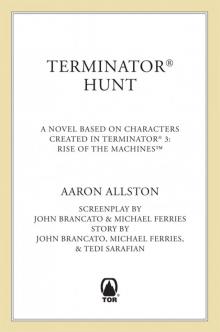 Terminator 3--Terminator Hunt
Terminator 3--Terminator Hunt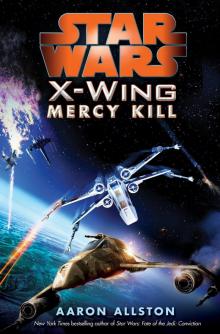 Mercy Kil
Mercy Kil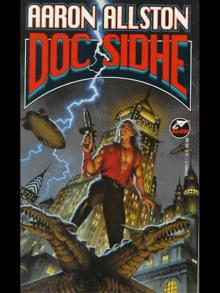 Doc Sidhe
Doc Sidhe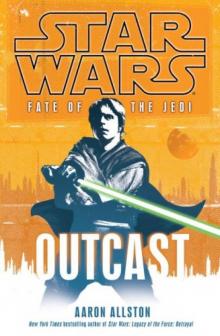 Star Wars: Fate of the Jedi: Outcast
Star Wars: Fate of the Jedi: Outcast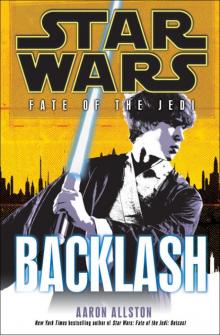 Fate of the Jedi: Backlash
Fate of the Jedi: Backlash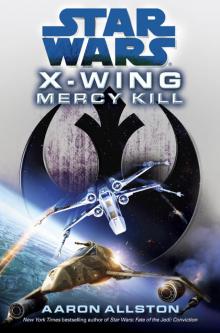 Mercy Kill
Mercy Kill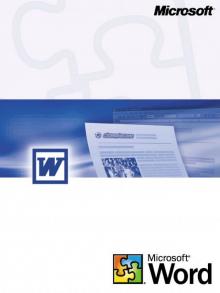 Rebel Stand
Rebel Stand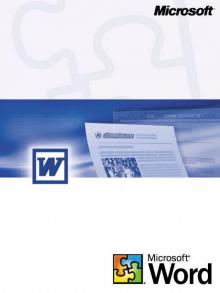 Wraith Squadron
Wraith Squadron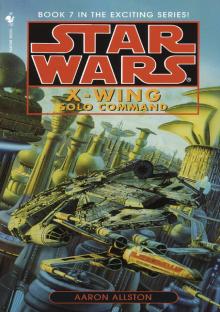 Star Wars: X-Wing VII: Solo Command
Star Wars: X-Wing VII: Solo Command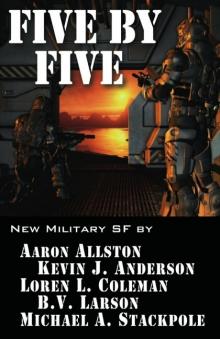 Five by Five
Five by Five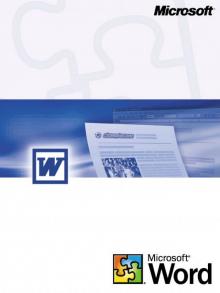 Solo Command
Solo Command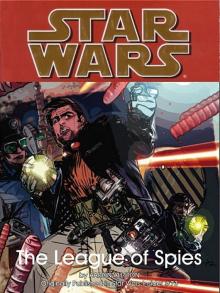 Star Wars: The Clone Wars Short Stories: The League of Spies
Star Wars: The Clone Wars Short Stories: The League of Spies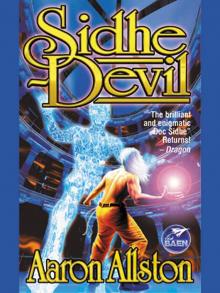 Sidhe-Devil
Sidhe-Devil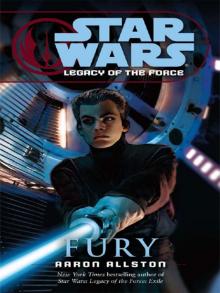 Star Wars: Legacy of the Force: Fury
Star Wars: Legacy of the Force: Fury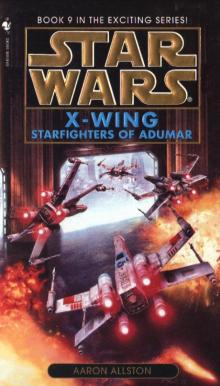 Starfighters of Adumar
Starfighters of Adumar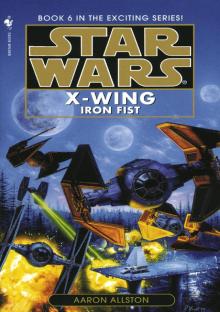 Star Wars: X-Wing VI: Iron Fist
Star Wars: X-Wing VI: Iron Fist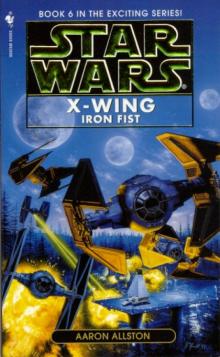 Star Wars - X-Wing - Iron Fist
Star Wars - X-Wing - Iron Fist Exile
Exile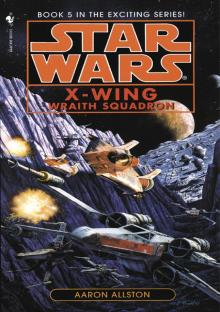 Star Wars: X-Wing V: Wraith Squadron
Star Wars: X-Wing V: Wraith Squadron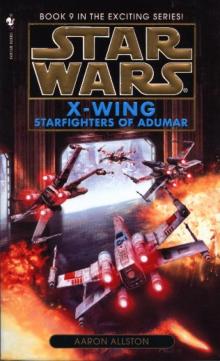 Star Wars - X-Wing - Starfighters of Adumar
Star Wars - X-Wing - Starfighters of Adumar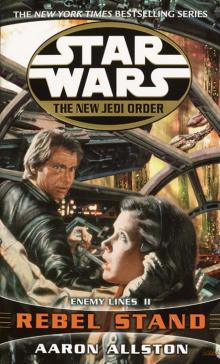 Rebel Stand: Enemy Lines II
Rebel Stand: Enemy Lines II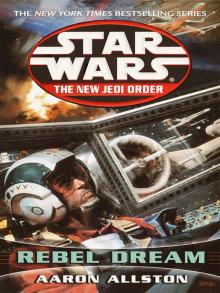 Rebel Dream: Enemy Lines I
Rebel Dream: Enemy Lines I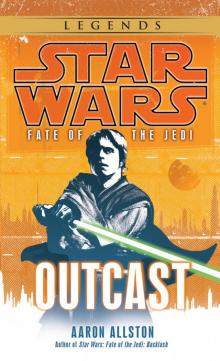 Outcast
Outcast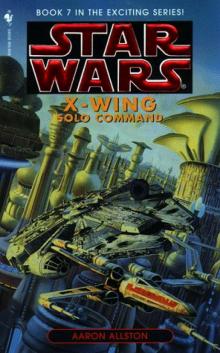 Star Wars - X-Wing 07 - Solo Command
Star Wars - X-Wing 07 - Solo Command